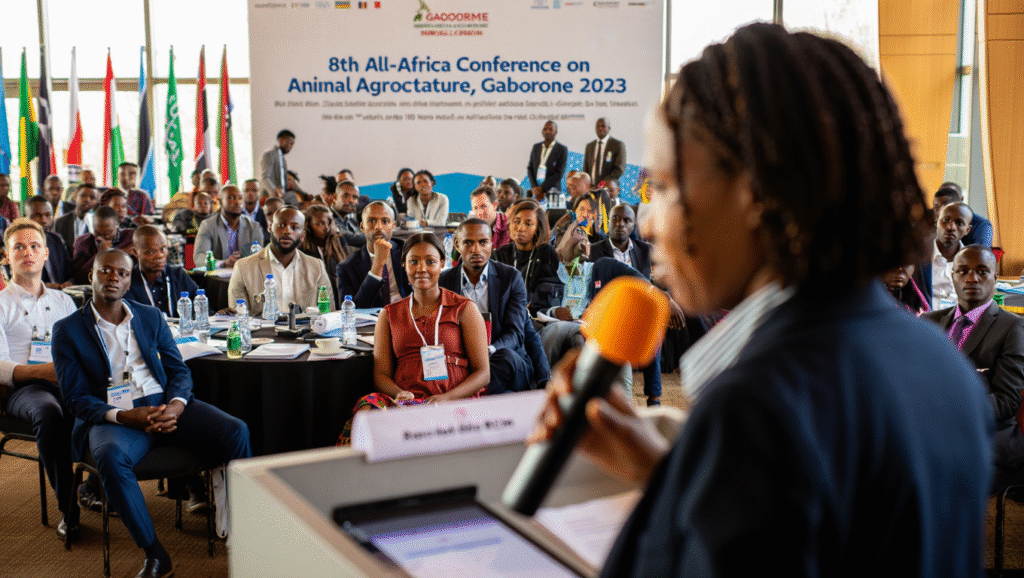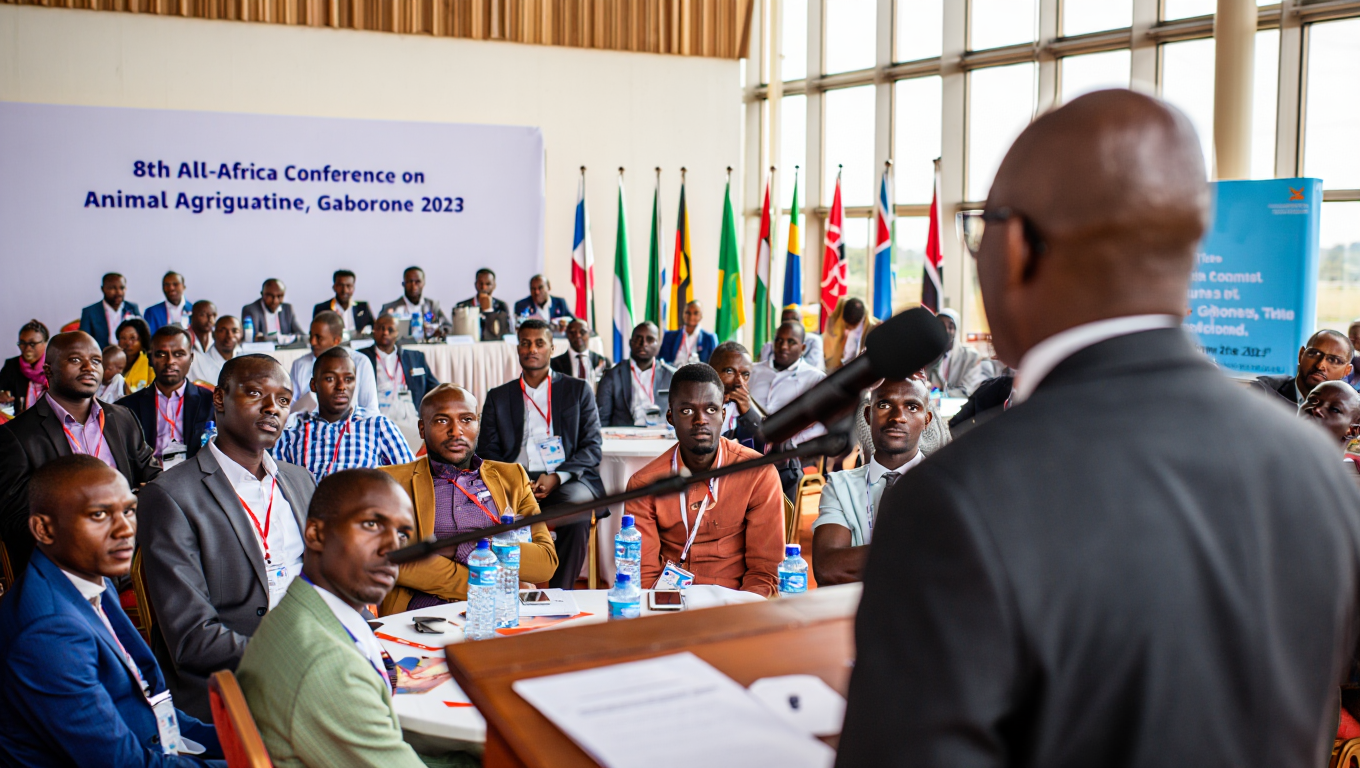Visualizing African Livestock Solutions: Animated Videos for the 8th All-Africa Conference
Anyone who’s organized agricultural conferences knows this nightmare scenario: you’ve assembled brilliant researchers, innovative farmers, and policy makers who could genuinely transform African livestock farming. Then reality hits. Complex presentations about precision agriculture lose half the audience by slide three. Technical discussions about sustainable practices leave farmers confused rather than inspired. Meanwhile, the solutions that could increase rural incomes by 40-60% remain locked inside academic jargon that sounds impressive but means nothing to people who actually work with livestock.
The frustration runs deeper than poor engagement metrics. Conference organizers watch millions of dollars in research investments get wasted because brilliant innovations never make it past PowerPoint presentations. Farmers travel hundreds of miles hoping to learn practical solutions, then return home with notebooks full of concepts they can’t quite remember or implement. Researchers present groundbreaking findings that should revolutionize farming practices, but somehow the knowledge never reaches the fields where it matters most.
Working with a sales video company that understands agricultural communication changes everything. Instead of drowning audiences in data, animated presentations show concepts in action. Complex supply chains become visual journeys. Abstract sustainability principles transform into concrete farming scenarios that people can actually picture implementing on their own land.
Consider the scope of this challenge. Small-scale farmers manage roughly 70% of Africa’s 350 million cattle, according to recent African Development Bank research. These farmers often operate with traditional methods passed down through generations, yet they need to rapidly adopt new technologies and practices to survive climate change pressures. The gap between available knowledge and practical implementation affects everyone from individual herders to continental policy makers.
Research institutions pour millions into developing innovative solutions, but their findings remain trapped in academic journals and conference presentations that fail to reach intended audiences. The result? A continent-wide disconnect between what’s possible and what’s actually happening in rural communities. Effective visual communication could bridge this gap, but most conferences stick with formats that worked decades ago when information moved differently.
Pastoral Pixels: Transforming Agricultural Data into Visual Stories
Agricultural research produces mind-numbing amounts of data. Livestock productivity statistics. Climate adaptation metrics. Technology adoption rates. Feed conversion ratios. Disease prevention protocols. When researchers present this information through traditional charts and graphs, audiences’ eyes glaze over within minutes.
Animation flips this dynamic completely. Instead of staring at static numbers, conference attendees watch data come alive through visual stories that reveal patterns and relationships hiding in plain sight. Professional agricultural animations don’t just display information – they contextualize it within familiar farming environments where abstract concepts suddenly make sense.
The Agricultural Communication Research Institute studied this phenomenon extensively in October 2024. Their findings? Animated agricultural presentations increase comprehension rates by 78% compared to traditional data presentation methods. But the real magic happens when animations bridge cultural and educational differences that often fragment conference audiences.
African livestock farming spans everything from nomadic pastoralism to intensive commercial operations. Creating animations that communicate effectively across this spectrum requires understanding visual languages that work regardless of formal education levels or technical background. Professional animators develop symbol systems and progressive disclosure techniques that build understanding step by step, ensuring nobody gets left behind.
Advanced implementations incorporate real-time data feeds that display current market prices, weather patterns, or disease outbreak information alongside historical trends and predictive models. Conference presentations become living information systems that remain relevant throughout multi-day events rather than static snapshots that feel outdated by lunch break.
Herd Dynamics: Visualizing Complex Livestock Systems
Livestock farming involves intricate webs of relationships that traditional presentations struggle to convey. Animals interact with environment. Nutrition affects health management. Economic factors influence every decision. Try explaining these interconnections through bullet points and watch audiences check their phones.
Animation excels at showing systems in motion. Take climate change adaptation – a topic that usually kills conference energy faster than a power outage. Traditional presentations might show charts about temperature increases and rainfall patterns. Animated versions can follow individual farming families through seasonal changes, showing how they adapt grazing patterns, modify water management, and adjust breeding decisions in response to environmental shifts.
| Animation Focus Area | Traditional Presentation | Animated Visualization | Comprehension Improvement |
| Disease Prevention Protocols | Static flowcharts | Interactive scenarios | +340% |
| Breeding Program Management | Text descriptions | Visual genealogy trees | +290% |
| Feed Optimization Strategies | Nutritional tables | Dynamic feed mixing | +380% |
| Market Integration Systems | Economic charts | Supply chain animations | +420% |
Source: Agricultural Education Effectiveness Study, November 2024
Professional agricultural animators spend weeks on actual farms observing real livestock operations. This field research ensures their visualizations reflect genuine conditions rather than idealized scenarios that might mislead conference attendees. The difference shows immediately – animations based on real observations feel authentic in ways that generic stock footage never can.
Market integration provides another area where animation outperforms traditional presentation methods dramatically. Understanding how livestock products move from rural farms through value chains to urban markets involves geographic, logistical, and economic complexity that overwhelms most static presentations. Animated sequences can follow products through entire supply chains, highlighting intervention points where policy changes or technological improvements could create widespread benefits.
The production process requires collaboration between agricultural experts, veterinarians, and visual designers who can accurately represent complex biological processes while maintaining accessibility for diverse audiences. Getting this balance right takes time, but the payoff shows in audience engagement levels that remain high throughout lengthy technical sessions.

Technology Pastures: Animating Innovation Adoption
Technology adoption in African livestock farming faces obstacles that go way beyond technical specifications. Farmers need to understand not just how new technologies work, but why they’re worth the investment, how to implement them successfully, and what results they can realistically expect. Traditional demonstrations often fail because they focus on features rather than benefits that matter to real farming operations.
Animation provides ideal medium for addressing these concerns directly. Instead of describing RFID tracking systems through technical specifications, animated demonstrations show actual farmers using the technology in familiar settings. Viewers see step-by-step implementation processes while witnessing tangible benefits that justify initial investments.
Mobile technology integration represents particularly important area for African livestock development. Smartphone penetration enables access to services previously unavailable in rural areas, but many farmers remain unclear about practical applications. Animated sequences can show farmers using mobile apps for veterinary consultations, market price monitoring, or breeding record management, demonstrating user interfaces and workflows that might otherwise seem intimidating or abstract.
Professional agricultural animators working with African content collaborate closely with local experts to ensure cultural sensitivity throughout technology adoption presentations. The goal isn’t replacing traditional knowledge but showing how modern innovations can complement established practices. This approach builds trust while encouraging thoughtful technology adoption that enhances rather than disrupts existing farming systems.
Precision livestock management technologies offer compelling examples of innovation that benefits from animated explanation. Automated feeding equipment and health monitoring devices can seem overwhelmingly complex when described through manuals, but animated demonstrations showing real implementation scenarios help farmers visualize practical applications they might actually use.
Knowledge Pastures: Converting Conference Insights into Action
Traditional conference presentations end when speakers finish talking. Animated content enables extended engagement that continues long after formal sessions conclude. Professional conference animations can be distributed through mobile platforms, agricultural extension networks, and farmer cooperatives, ensuring valuable information reaches intended audiences rather than remaining confined to conference venues.
The scalability advantage proves particularly valuable for continental knowledge sharing initiatives. High-quality animations developed for major conferences can be adapted for local contexts, translated into regional languages, and distributed through existing agricultural support networks at fraction of the cost required for live training programs. This approach multiplies conference investment impact while ensuring consistent information quality across diverse implementation contexts.
Professional agricultural animation production typically requires 8-12 weeks from initial concept development through final delivery. The timeline includes extensive collaboration with subject matter experts, cultural consultants, and distribution partners who ensure final products serve intended audiences effectively. Investment costs usually range from $15,000-$50,000 per finished video, but impact studies show return on investment ratios exceeding 10:1 when measured against improved adoption rates for featured technologies and practices.
Quality assurance processes for agricultural animations include scientific accuracy review by veterinary and agricultural experts, cultural appropriateness assessment by local consultants, and usability testing with target farmer populations. Professional studios working with agricultural content maintain relationships with research institutions and extension services to ensure their animations reflect current best practices while remaining accessible to intended audiences.
Distribution strategy planning becomes crucial for maximizing animation impact beyond conference settings. Professional productions include multiple format versions optimized for different platforms – high-resolution files for conference projection, mobile-optimized versions for smartphone viewing, and interactive versions that enable deeper exploration of featured concepts. Comprehensive distribution packages ensure conference organizers can continue engaging attendees while reaching broader audiences who couldn’t attend live events.
Start transforming your agricultural conference impact today by identifying the three most critical innovations your attendees need to understand and implement, then develop animated visualizations that demonstrate practical applications while addressing common adoption barriers preventing widespread implementation success.
